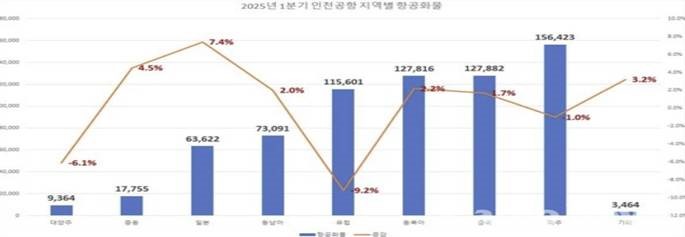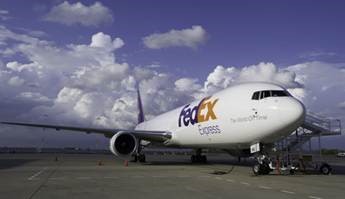엑스트란스 - 항공 물류 업데이트 - 17주차 블로그
항공화물 General
1) HKG우체국 미국행 우편물 수취 중단

- 홍콩 우체국이 미국행 우편물 수취를 중단한다고 밝혔고, 결국 전자상거래 물동량 움직임에 큰 영향을 미칠 전망.
- 해상으로 운송되는 우편물은 16일부터 중단. 항공으로 운송되는 우편물은 오는 27일 부터 수취를 중단한다고 밝힘.
- 미국의 중국·홍콩발 목록통관 검사 강화에 따른 후속 대응 조치. 트럼프 행정부는 지난 4월 2일 중국과 홍콩발에 대해 건당 800달러 이하에 적용했던 목록통관 기준을 폐지. 대신 수입 제품 가격의 30%의 관세를 부과하기로 함. 목록통관 건당 25 달러를 부과한다고 밝히며 오는 6월 1일부터는 건당 50달러로 100% 인상
- 이같은 조치는 오는 5월 2일부터 본격 시행. 이같은 미국의 조치에 대해 홍콩 우체국 이 미국에 대한 우편물 수취를 중단한 것으로 풀이. 대신 홍콩 우체국은 추가 비용을 발송인이 부담하는 경우는 수취가 가능하다고 하며 미국에 대한 발송물이 서류로만 이뤄진 경우는 발송이 가능하다고 설명.
- 결국 중국과 홍콩 전자상거래 물량에 대한 영향이 커질 전망. 이같은 영향이 국내 항공 물류산업에는 새로운 호재나 기회로 작용할 가능성도 매우 높은 것으로 풀이.
2) 테무·쉬인, 소포 면세 철폐에 미국서 가격 인상

- 중국 전자상거래 공룡 테무와 쉬인이 미국 시장에서 가격 인상에 나섬. 도널드 트럼프 미국 행정부가 중국산 소액소포에 대한 비과세 조치를 폐지함에 따라 가격 전가 압박을 받는 모습.
- 16일(현지시간) 로이터통신에 따르면 양사는 홈페이지에 올린 성명에서 “글로벌 무역 규칙과 관세 변화로 운영 비용이 증가하고 있다”며 “품질에 타협하지 않고 제품을 계속 제공하기 위해 25일부터 가격을 조정한다”고 공지.
- 테무와 쉬인은 800달러(약 114만 원) 미만의 소액화물 관세를 면제해주는 ‘소액 면세 제도’를 활용해 저렴한 가격에 상품을 제공 하면서 미국 시장에서 급성장.
- 양사는 저가 중국산 의류와 생활용품을 수입해 미국에서 판매하는데, 일부 제품은 개당 10달러 이하인 경우도 많아 인플레이션에 시달리는 미국 소비자들에게 인기.
- 테무와 쉬인은 관세 전쟁의 여파로 주요 온라인 플랫폼에 대한 광고 지출도 대폭 줄인 것으로 나타났다. 파이낸셜타임스(FT)는 글로벌 시장조사 업체 센터사워를 인용해 테무가 13일까지 2주간 소셜미디어 등에 대한 광고 지출을 전달보다 약 31% 줄였다고 전언.
3) ICN항공 하루평균 항공화물 7,722톤 처리

- 지난 1분기 인천공항(ICN)의 총 항공화물은 69만 5,018t으로 전년동기 대비 0.3% 감소. 하루 평균 7,722t의 항공화물을 처리한 셈.
- 화물기를 포함한 전체 운항편은 총 10만 5,817편으로 5.7% 증가했다. 하루 평균 1,176편이 운항.
- 노선별로는 미주노선이 가장 많은 15만 6,423t으로 전년동기 대비 1.0% 감소. 이어 2 위노선이 중국으로 12만 7,882t으로 1.7%, 3위 노선이 동북아로 12만 7,816t으로 2.2%가 각각 증가. 한국발 4위노선은 유럽으로 11만 5,601t으로 전년동기 대비 9.2% 감소.
- 이어 5위노선은 동남아로 7만 3,091t으로 2.0%, 6위노선은 일본으로 6만 3,622t으로 7.4%, 7위가 중동으로 1만 7,755t으로 4.5%가 증가.
- 전년동기 대비 항공화물이 가장 크게 증가한 노선은 일본으로 7.4%가 증가. 이어, 중 동노선이 전년동기 대비 4.5%, 동북아가 2.2%, 동남아가 2.0%, 중국노선이 1.7% 각각 증가. 하지만 유럽노선은 전년동기 대비 9.2%, 대양주는 6.1%, 미주노선도 1%가 각각 감소.
4) UPS·FedEx, 디 미니미스 종료 앞두고 중국발 화물에 할증료 부과

- 미국이 중국발 소포에 대한 디 미니미스(관세 면제 기준) 적용을 곧 종료할 예정인 가운데, UPS와 FedEx가 이를 앞두고 중국발 택배화물에 대한 추가 요금 부과에 나섬.
- UPS는 4월 13일부터 중국, 홍콩, 마카오발 미국행 소포에 대해 파운드당 0.29달러의 ‘surge fee’를 부과.
- 이 할증료는 해당 화물의 운임허용중량(billable weight)을 기준으로 책정되며, 유류할증료(fuel surcharge)가 별도로 적용.
- 이에 뒤이어 FedEx도 4월 15일부터 중국, 홍콩, 필리핀발 미국행 소포에 대해 파운드당 0.45달러의 ‘demand surcharge’를 도입. 다만 FedEx의 할증료는 한시적으로 적용되며, 중국산 소포의 디 미니미스 면제 종료일인 5월 2일까지만 유효.
- 물류 시장 분석기관인 ‘Logistics Trends & Insights’의 수석 애널리스트 캐시 모로-로버슨(Cathy Morrow-Roberson)은 “이번 할증료 부과는 일시적인 수요 대응이 아닌 수익성 유지를 위한 전략”이라고 분석. 특히 UPS와 FedEx는 분기 실적 발표마다 꾸준히 화물당 수익성 보호의 필요성을 강조해왔으며, B2C 수요는 꾸준히 증가하고 있는 반면 B2B 물량은 정체된 상태.
- 실제로 미국의 제조업 구매관리자지수(PMI)는 두 달간의 회복세를 뒤로하고 3월 다시 위축 국면에 들어섰으며, 경기 불확실성이 지속되는 상황.
- 문제는 이커머스 시장 전반에서도 성장세 둔화 조짐이 나타나고 있다는 사실. 블룸버그에 따르면 아마존은 최근 중국과 아시아 국가들로부터 미국 내 물류센터로 반입 예정이던 에어컨, 의류 등 생활용품 주문을 대거 취소한 것으로 알려짐

top



